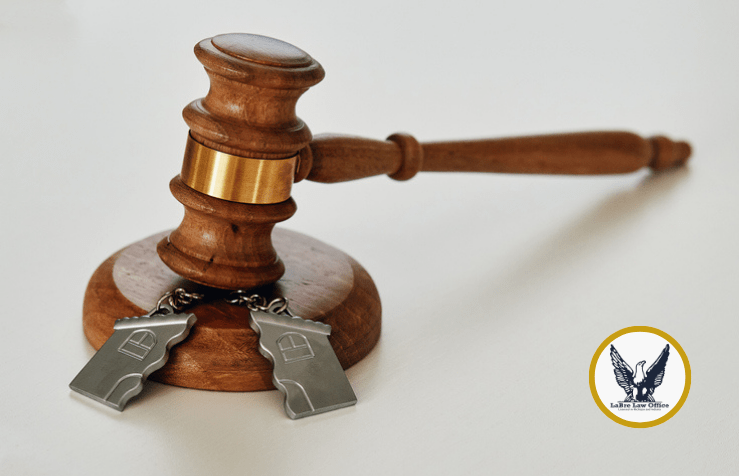How Is Property Divided in a Divorce in Michigan?
February 1, 2024 – Rob LaBre
Mike and Katie thought their marriage would last forever. Never in a million years did they think they’d contemplate the divorce process after 15 years of living as husband and wife, but somewhere along the way, they grew apart. Although the couple did not have children, saving them the heartache of child custody disputes, they had concerns about dividing property, reaching property agreements, and determining separate and community property.
Mike and Katie’s apprehensions about fairly divided property is understandable and common for couples facing a divorce. As an experienced Michigan family law attorney can attest, the fair division of assets during divorce can involve many complex legal factors. Michigan state law wants assets that were acquired during the marriage to be divided fairly—not necessarily equally. However, determining separate and community property and how to divide property and debts depends on the circumstances of each case. Variables like the length of the marriage, joint accounts, joint debt, car loans, mortgage payments, and retirement accounts all influence how courts assign value to property.
For Mike and Katie and all couples seeking a divorce agreement both parties can accept, it’s wise to consult a skilled divorce lawyer in Michigan. They can guide you through property division of your marital estate, advise you on reasonable settlement expectations based on state guidelines, and protect your rights when dividing your property. While a judge decides property division impartially, the process of dividing assets involves nuanced discussions, based on each case’s unique details. If you are undergoing or considering a divorce, understanding your rights and options is critical.
How is property divided in a divorce?
In this blog, an experienced Michigan divorce attorney describes how property division works and what you can expect from your divorce proceedings. Continue reading to learn more, then call us at (269) 431-2058 to schedule a consultation.
At the LaBre Law Office, excellence is our standard.
What Are Considered Assets in a Divorce?
Michigan defines assets as real estate, vehicles, bank accounts, retirement funds/pensions, investment accounts, businesses, and personal property such as furniture and jewelry. Anything of significant monetary value acquired during the course of the marriage is generally viewed as a marital asset subject to division between the spouses, including assets solely owned by one spouse and jointly held property. The court’s goal is to split these marital assets equitably.
Separate and Marital Property
Marital property includes assets and possessions acquired jointly or individually by either spouse during the marriage. This includes equity in a marital home, retirement accounts accrued while married, vehicles purchased together, and bank accounts containing commingled funds from both partners over time.
Separate property refers to items brought into the marriage by one spouse or acquired solely in one individual’s name after separation. Inheritances, property owned prior to the wedding, and gifts intended for one person are considered separate. Separate property is not eligible for division but may be factored into overall property settlement discussions to achieve an equitable outcome. Proving clear separate ownership can influence how marital property division is determined.
How Is Marital Property Divided?
The law generally requires marital property to be equally divided between divorcing spouses in Michigan. However, the judge can decide to alter this baseline 50/50 distribution based on relevant factors, such as:
- Length of the Marriage: Shorter marriages may result in less than 50/50 splits.
- How Each Spouse Contributed to the Marriage: Financial support from income or homemaking are both considered valuable contributions.
- Age and Health: The division seeks to avoid impoverishing one spouse, especially if an illness prevents employment.
- Earning Abilities: Greater earning potential factored against needs for support of minor children living with each parent.
- Needs of Minor Children: Property is allocated in a way that allows adequate housing and standard of living for any children.
- Other “Just and Reasonable” Considerations: Factors like domestic violence, infidelity, waste of assets may influence distribution.
When determining how to equitably divide the marital property between divorcing spouses, the judge decides after careful consideration of each of these factors. Ensuring a fair outcome is the ultimate goal.
How Is the House Split in a Divorce?
The court will consider a few different options when dividing up the marital home in a Michigan divorce. Often, the house will be sold and the equity split evenly between the spouses. However, one partner may be awarded the house and required to refinance and remove the other’s name from the mortgage. On the other hand, one spouse could be given the option to buy out the other partner’s share of the equity.
Following the same standards of division that apply to all other types of marital property, when determining how to divide up ownership and value of the marital home, the court will consider how long each party lived in the house, who made the largest share of financial contributions toward purchasing and improving it, and the needs and best interests of any minor children.
Is Separate Property Ever Subject to Division?
Unlike marital property, separate property is not generally eligible for division between the divorcing spouses. Separate property includes assets owned prior to the marriage or inherited/gifted to one spouse individually.
However, if separate property has been commingled with marital assets or used for familial purposes, such as paying household bills with an inherited IRA, a court may consider this blurring of separate property when determining an equitable distribution. Nonetheless, as long as clear records exist showing separate ownership, the property will likely remain with the original owner.
Will I Be Responsible for My Ex-Spouse’s Debt?
In general, only debt accrued jointly during the marriage will be considered marital debt, subject to division between the divorcing spouses. Separate debt accumulated by one spouse before or after the marriage in their name alone will typically remain their sole responsibility.
However, a court may order spousal support or assign a portion of marital debts depending on specific circumstances. For example, if one spouse wasted marital assets or incurred excessive credit card debt just before a divorce, a judge may allocate more of the joint liabilities to that person. In some cases, certain debts connected to specific marital assets may be assigned to the spouse who is awarded ownership of that asset in the property settlement. For example, a loan used to purchase a vehicle could remain the responsibility of the party granted possession of that vehicle.
Thoroughly review all joint debt held and individual debt you and your spouse have, then consult a divorce lawyer in Michigan to understand your property and debts and their role in your divorce agreement.
LaBre Law Office’s Divorce Lawyers in Michigan Can Guide You Through Divorce and Property Division with Excellence As Our Standard
Do you have questions and concerns about dividing your property through the divorce process? Have you been searching online for “family law divorce attorneys near me?” With 43 years of combined experience, LaBre Law Office’s divorce lawyers in Michigan are ready to guide you through each step of the process, no matter how complex your case. Contact us at (269) 431-2058 or complete our online form to schedule a consultation.
Copyright © 2024. LaBre Law Office. All rights reserved.
The information in this blog post (“post”) is provided for general informational purposes only and may not reflect the current law in your jurisdiction. No information in this post should be construed as legal advice from the individual author or the law firm, nor is it intended to be a substitute for legal counsel on any subject matter. No reader of this post should act or refrain from acting based on any information included in or accessible through this post without seeking the appropriate legal or other professional advice on the particular facts and circumstances at issue from a lawyer licensed in the recipient’s state, country, or other appropriate licensing jurisdiction.
LaBre Law Office
68897 Cass St,
Edwardsburg, MI 49112
(269) 431-2058
https://labrelaw.com/

Contact Us
Every situation is different and requires personalized legal strategy and attention. Tell us about your current situation and we would be happy to discuss your legal options. We have the skills, experience and resources needed to provide you with compassionate legal service.
* Required Fields
We respect your privacy. The information you provide will be used to answer your question or to schedule an Appointment if requested.
Related Blog Posts

How Is Property Divided in a Divorce in Michigan?
Mike and Katie thought their marriage would last forever. Never in a million years did they think they’d contemplate the divorce process after 15 years of living as husband and…

The Silent Struggle: Addressing the Emotional Impact of Divorce on Men
New data released by the U.S. Census Bureau reveals a sharp decline in marriage and divorce rates. In 2021, the U.S. marriage rate dropped to 14.9 marriages per 1,000 women,…

How to Find the Best Divorce Attorney in Michigan
Divorce can be emotionally draining and overwhelming, but it can also give you a chance to start fresh and decide about your future. However, to achieve the best possible outcome,…
